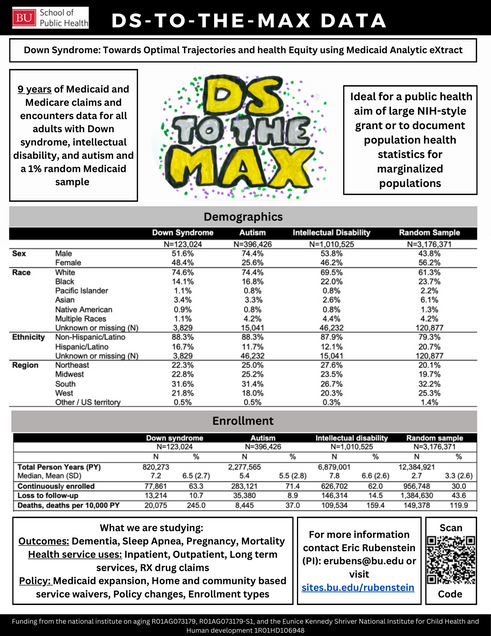DS-TO-THE-MAX
(Down Syndrome: Toward Optimal Trajectories and Health Equity using Medicaid Analytic eXtract)

We want to improve health across the life course for individuals with Down syndrome.
Nearly all adults with Down syndrome use Medicaid. Medicaid is a type of public health insurance for individuals with disabilities or low income in the United States. Our research uses Medicaid data to understand the causes of obstructive sleep apnea, dementia, and mortality among individuals with Down syndrome.
DS-TO-THE-MAX will:
- Help doctors, nurses, and other health providers create guidelines for treatment.
- Support researchers in designing interventions.
- Assist advocates in shaping public health messaging and policy change.
About the dataset:
We have built a large data set of 135,000 adults with Down syndrome in Medicaid and Medicare from 2011 to 2019, with plans to add data from 2020 to 2022. This dataset represents nearly all adults with Down syndrome and is 100 times larger than other Down syndrome datasets.
DS-TO-THE-MAX Data One Pager
Some of what we’ve found:
- Adults with Down syndrome rely heavily on Medicaid and Medicare, using these services more frequently and at a higher cost than their peers with other intellectual disabilities.
- About 40% of adults with Down syndrome are enrolled in both Medicare and Medicaid, with enrollment patterns varying by race and region.
- While age-adjusted mortality rates are similar between Black and white individuals with Down syndrome, rates are lower for Pacific Islander, Asian, Native, and mixed-race groups (Tewolde et al., in press).
- Hospitalization rates are higher among all marginalized racial and ethnic groups compared to white individuals (Tewolde et al., in press).
Learn about our Co-Research Team!
Additional info:
Funding: 1R01AG073179-01
PI: Eric Rubenstein, PhD ScM
